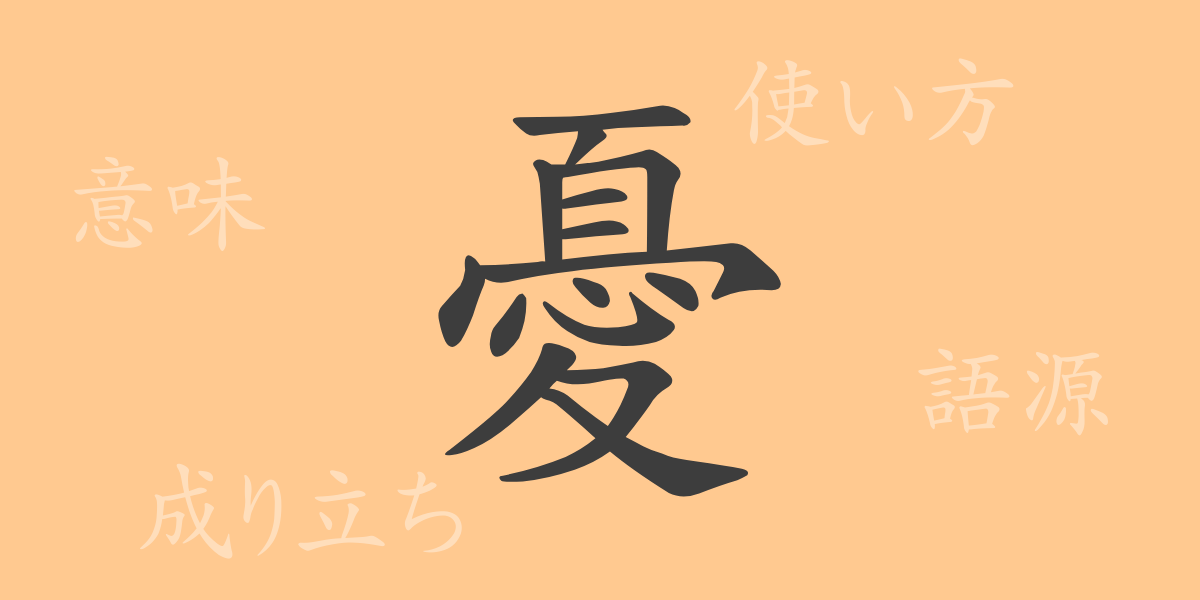Japanese characters each carry deep meanings and rich histories. One of the common kanji, “憂” (yū), plays a crucial role in expressing the Japanese spirit and delicate emotions. In this article, we will delve into the origins, meanings, usages, readings, stroke count, and radical of “憂” (yū). Additionally, we will explore idiomatic expressions, proverbs, and phrases that include “憂” (yū). Let’s immerse ourselves in the world of “憂” (yū), a symbol of the beauty and complexity of the Japanese language.
The Origins of 憂 (yū)
The kanji “憂” (yū) has evolved from ancient Chinese characters. Originally derived from pictograms depicting a troubled heart, it came to signify heavy emotions and thoughts one carries within. In Japan, this character has been used since ancient times, appearing in literary works from the Heian period. The left side of the character represents “忄” (risshinben), a radical indicating heart or mind, combined with “幽” (yū), suggesting emotions confined within.
The Meaning and Usage of 憂 (yū)
“憂” (yū) often refers to negative emotions such as sadness, worry, and suffering. It is commonly used in words like 憂鬱 (yūutsu) and 憂国 (yūkoku). Additionally, it expresses deep emotions that resonate with people. For instance, the phrase “a face tinged with 憂 (yū)” conveys a subtle sense of sadness or empathy in a person’s expression.
Readings, Stroke Count, and Radical of 憂 (yū)
The kanji “憂” (yū) adds depth to Japanese expressions with its form and meaning.
- Readings: In on’yomi (音読み), it is read as “ユウ” (yū), and in kun’yomi (訓読み), it is read as “うれ・え・うれ・い” (ure, e, ure, i).
- Stroke Count: It comprises 15 strokes.
- Radical: The radical is “忄” (risshinben), indicating the heart or mind.
Idioms, Proverbs, and Phrases Featuring 憂 (yū) and Their Meanings
There are numerous idiomatic expressions, proverbs, and phrases that include “憂” (yū), showcasing the richness of Japanese expression. Here are a few examples:
- 憂鬱 (yūutsu): Describes a state of gloominess or depression.
- 憂国 (yūkoku): Refers to worrying about the future of one’s country.
- 憂世 (yūsei): Indicates being troubled by various issues in the world.
- 国憂い (kuniurei): Means feeling concern for one’s country.
- 憂さ晴らし (usabarashi): Actions taken to relieve one’s worries.
These expressions require a nuanced understanding of Japanese emotions and actions, offering a glimpse into Japanese culture.
Summary of 憂 (yū)
The kanji “憂” (yū) plays a vital role in expressing Japanese emotions and psychology. Its rich meanings and usages demonstrate the depth of Japanese expression, possessing the power to resonate with people’s hearts through language. Idioms and proverbs featuring “憂” (yū) continue to be used in daily conversations and literary works to depict the movements of the human heart. Understanding this kanji is a step towards a deeper appreciation of the beauty of the Japanese language.

























